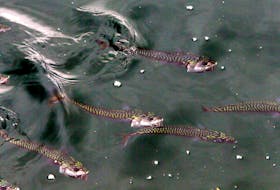One of the biggest problems small communities face is having someone skilled at maintaining their water quality, says Eddie Joyce.
The independent legislature member for Humber-Bay of Islands was reacting to his experience dealing with towns within his district that have elevated levels of disinfection byproducts in their drinking water.
In recent weeks, The Western Star has published a series of stories outlining how many towns in Newfoundland and Labrador have elevated levels of byproducts such as trihalomethanes (THMs) and haloacetic acids (HAAs) in their drinking water.
Related stories:
MHA Scott Reid says he’d have no issue drinking Pasadena’s water
Discontinuation of new water treatment technology led to Milltown mayor's resignation
Newfoundland and Labrador approves drinking water disinfection method that doesn't create THMs
Pasadena, St. Paul’s among the towns grappling with unacceptable THM levels in its drinking water
These byproducts are created when chlorine used to disinfect water reacts with naturally occurring organic materials in the water. Long-term exposure to elevated levels of these chemicals has been linked to cancer, reproduction issues and other illnesses.

Several towns within western Newfoundland are on the list that have levels of THMs and HAAs that exceed Health Canada standards.
“It’s very important to make sure towns have individuals trained for the amounts (of chlorine) that’s needed and to do the proper testing of the water also,” said Joyce. “It might not get rid of (disinfection byproducts), but it might help with the amount of chlorine that goes in the water.”
He encouraged towns to pool their resources and share the costs of hiring one skilled person to control their water quality together.
In Joyce’s district, McIvers has the highest levels of both THMs and HAAs. He said no town in the Bay of Islands has approached him recently about this specific challenge or what to do about it, but he said it is an issue he’s been working with them on for the roughly three decades he’s been in politics.
The biggest water quality concern in the district lately, according to the MHA, has been discoloured water in Irishtown-Summerside.
Joyce said people who have concerns about drinking their water right now can take measures, such as filtering their tap water before consuming. Proper filters can remove disinfection byproducts from the water.
“I drink the water in McIvers all the time when I go out there,” he said.
Joyce had been the province’s municipal affairs minister before he was removed from the Liberal caucus earlier this year. He said, as minister, he helped secure funding for pilot projects that use hydrogen peroxide, rather than chlorine, to disinfect water.
There had been two such pilot projects, one in Sunnyside and another in Milltown, using new technology developed by Ontario-based company SanEcoTec. The one in Sunnyside in Bull Arm is continuing, but Milltown voted to revert back to using chlorine because that Bay d’Espoir town didn’t feel it could afford to use the hydrogen peroxide method.
Joyce said more work may need to be done to determine if the hydrogen peroxide method, which is now an approved technology in Newfoundland and Labrador, will be used by more communities.
“I wouldn’t put that out there as the be-all, end-all solution to cure all these issues, but it is definitely a step in the right place and you have to try new technology and see if it works,” he said.









